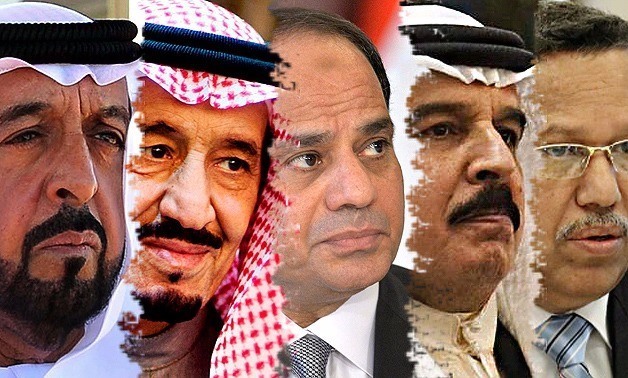
Leaders of Arab countries - combination by Egypt Today
CAIRO - 24 August 2017: Eighty days ago, Qatar woke up to a decision by four Arab states to cut their diplomatic ties with Doha over "its continuous support for terrorism," closing their airspace and seaports for the Qatari transportation.
Egypt, Saudi Arabia, the UAE, and Bahrain issued a statement clarifying that diplomatic relations have been suspended over Qatar's support of the outlawed Muslim Brotherhood, in addition to promoting Daesh’s terrorist ideology (Islamic State militant group) and Al-Qaeda groups.
Qatar, on the other hand, kept denying the accusations made by Arab countries; yet
links with terror organizations, including the Muslim Brotherhood and Al Qaeda become clearer as time passes.
To date, Qatar has refused to cooperate with mediation, and has stuck its ground.
Evidence of Qatar's ‘supporting terrorism’
The U.S. Department of Treasury issued a document dated back to October 2014, revealing that some Qatari nationals like Salim Hassan Khalifa Rashed Al-Kuwari - described as ‘Al-Qaeda financier’ - is accused of transferring “tens of thousands” of dollars to Al-Qaeda through a terrorist network.
Emirati Ambassador to Russia Omar Ghobash stated that Qatar provided Al-Qaeda with information that enabled its associates to carry out suicide attacks against Emirati forces taking part in the Arab coalition in Yemen.
In Libya, Libyan army spokesman Colonel Ahmed al-Mesmari displayed a documentary on the Qatari role in Libya. “Qatar has several supply lines in Libya. It supplies terrorist Ali Al-Salabi, who is the leader of Al Qaeda in Libya, with shipments of weapons.”
The Arab Quartet therefore called on Qatar to end its support to terrorist organizations and sent 13 demands on July 23 to the tiny Gulf state to fulfill as a condition for the restoration of diplomatic ties. Qatar has so far refused to forfeit its obstinate stance.
What are the demands?
The list of demands included closing Al-Jazeera television channel, reducing ties to their regional adversary Iran, and the closing of a Turkish military base in Qatar.
The demands, handed to Qatar by mediator Kuwait also require that Qatar refrain from interfering in the four countries' domestic and foreign affairs and halt the practice of giving the Qatari nationality to citizens of the four countries, said the official, who spoke on condition of anonymity. The countries gave Doha 10 days to comply with their demands.
How did Doha respond to Arab demands?
Doha not only stuck to its stubborn policy in ignoring Arab demands; but also went on to enhance its relations with Turkey and Iran, provoking the Quartet’s anger.
Ironically, Qatar responds to the Quartet’s demand to close a Turkish military base by increasing Turkish security checkpoints and barriers inside Qatar.
It goes on to defy the Quartet by agreeing to co-jointly hold naval and military maneuvers in the Arab Gulf waters with Turkey. Moreover, Turkey has sent about 5,000 soldiers to Doha upon the Emir of Qatar Tamim bin Hamad bin Khalifa Al-Thani’s request.
Doha also continued enhancing its relations with Iran in a clear challenge to the Quartet’s demands. Qatar’s Tamim bin Hamad Al-Thani shows full support to the Shi’ite state through sending a delegation to the inauguration ceremony of Iran’s president, returning Qatar’s ambassador to Iran, and signing cooperation agreements with Iranian businessmen.
The Qatari-led Al-Jazeera channel continued supporting the banned Muslim Brotherhood and portraying Arab countries negatively. Al-Jazeera also used to particularize negative coverage in Egypt to incite violence.
Why Egyptians won’t forgive Qatar?
The Qatari regime is responsible for the lives of victims who have been killed by terrorist operations supported by Qatar in Egypt and other Arab countries, Egyptian Parliamentarian Mohamed Abou Hamed announced on several occasions recently.
On June 18, two police officers died in a blast targeted at a Central Security Forces (CSF) vehicle on the Autostrad Road near the Cairo suburb of Maadi. Four security personnel were also injured.
In July, three security personnel were killed and another ten injured in an armored explosion south of Arish city, North Sinai.
Two police officers and one conscript have been killed in a terrorist attack targeting a checkpoint in Al-Ayat, Giza governorate.
Qatar is accused of supporting and funding terrorism in the region, besides harboring fugitive extremists who issued fatwas allowing the killing of civilians.
Egypt’s Parliamentarian said that prosecuting Qatar in the international courts for supporting terrorist groups would bring justice to the martyrs who fell as a result of terrorist acts.
Tensions between Qatar and the other Arab Gulf states strained after Qatari Emir Tamim bin Hamad Al-Thani directed a message to the four Arab countries - Egypt, the UAE, Saudi Arabia and Bahrain - that “being hostile to Iran is unwise.”

Comments
Leave a Comment